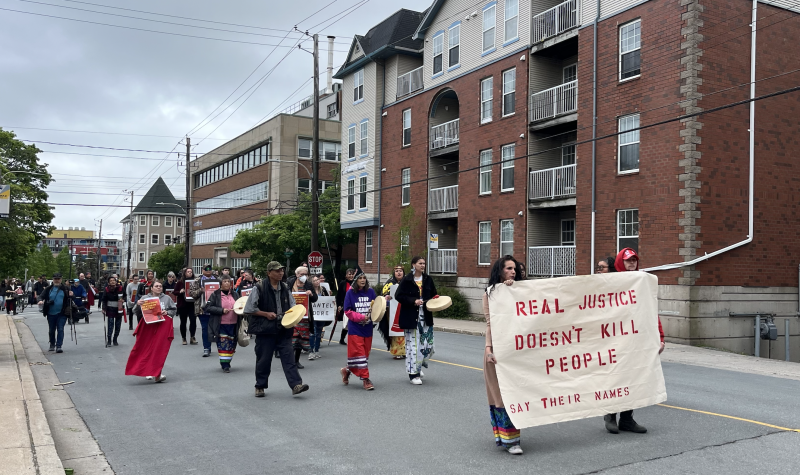Marchers began their walk Tuesday afternoon from the Peace and Friendship Park to Halifax Central Library to commemorate the lives of Peter Paul, Sarah Rose Denny, Chantel Moore, Skyler Sappier and Gladys Marie Simon.
The marchers are calling for a Mi’kmaw-led fatality inquiry and a justice reform after the recent deaths of Paul and Denny while in provincial custody.
Paul, 27, was a Two-Spirited individual from Eskasoni First Nation who died by suicide in the Cape Breton Correctional Facility in January.
Paul’s brother, Gilbert Paul, spoke at the march about his brother’s death.
“We want a Mi’kmaw-led fatality inquiry and we want it now,” Gilbert says.
Paul was picked up by police a year prior to his death and told officers he was having suicidal thoughts.
“In a heavily monitored setting, how was he able to take a sheet, wrap it around his neck and commit suicide?” Gilbert says.
Denny, 36, from Eskasoni First Nations died from complications from pneumonia in March. Denny was transferred to the hospital from Central Nova Scotia Correctional Facility in Burnside after coughing up blood.
Denny’s mother, Katherine Noel Denny, spoke at the march about her daughter not receiving medical attention while at the Burnside jail.
“I want an inquiry. Why did my daughter die? Why was she denied a doctor?” Katherine says.
Denny’s mother says she wasn’t taken to the hospital until she was unresponsive, although she says she still doesn’t know exactly what happened to her daughter.
“I don’t even know if they took her blood pressure or her temperature,” Katherine says.
Prisoner Advocacy and Transformational Hub organized the march and are asking for a public inquiry and systemic reforms that prioritize the safety of Indigenous Peoples.
The family of Skyler Sappier who died in Saint John Regional Correctional Centre from COVID-19 in January 2022 filed an inquest into his death.
Raeann Michaud, the sister of Skyler Sappier says he was not receiving the medical attention he should have.
“Even though his oxygen levels kept dropping, even though he was complaining of chest pains they still didn’t send him to the hospital,” Michaud says.
An internal investigation reviewed footage of Sappier while in the medical unit of the jail. A correctional officer claimed to check on Sappier 10 times throughout the night, Michaud says. But the investigation revealed the officer only checked on him eight times and most of the checks didn’t involve any verbal communication with Sappier.
“[The investigator] could tell from the video—with no sound—that my brother was unwell,” Michaud says.
Sappier’s family was disappointed by the inquest and say more policies should be put in place to ensure inmates are brought to a hospital before it's too late.
“He deserved a chance to fight this, not sit in a cell probably knowing that he was dying,” Michaud says.


